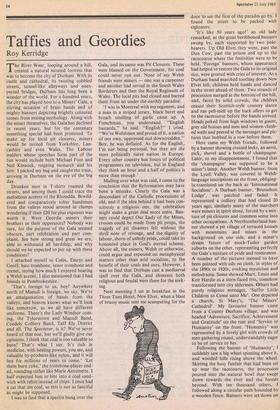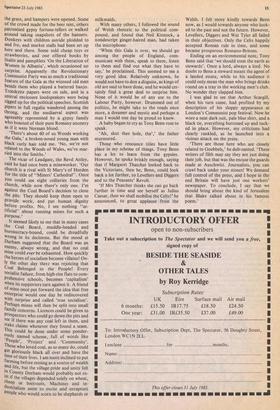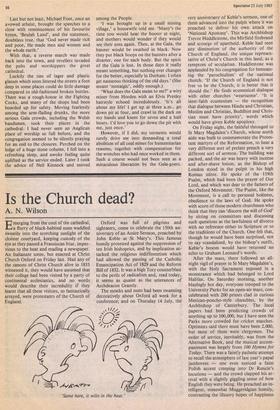Taffies and Geordies
Roy Kerridge
The River Wear, looping around a hill, created a natural moated fortress that was to become the city of Durham. With its
castle and cathedral, its twisting cobbled streets, tunnel-like alleyways and unex- pected bridges, Durham has long been a wonder of the world. For a hundred years, the city has played host to a Miners' Gala, a stirring occasion of brass bands and of mighty banners depicting brightly coloured scenes from mining mythology. Along with the mines themselves, the Gala has declined in recent years, but for the centenary something special had been promised. To make up for local pit closures, miners would be invited from Yorkshire, Lan- cashire and even Wales. The Labour lealders whose speeches form part of the fun would include both Michael Foot and Neil Kinnock, reigning monarch and his heir. I packed my bag and caught the train, arriving in Durham on the eve of the big day.
Drunken men in T-shirts roamed the streets, and among them I could trace the melodious accents of the Rhondda. Bewild- ered and comparatively sober bandsmen from the valleys stood around in clumps wondering if their £20 fee plus expenses was worth it. Were Geordie miners their brothers or their oppressors? Nobody was sure, for the purpose of the Gala seemed obscure, part celebration and part com- plaint. See how strong and great we are, able to withstand all hardship, and why should we be expected to put up with these conditions?
I attached myself to Colin, Emrys and Geoff, bass trombone, tenor trombone and
cornet, saying how much I enjoyed hearing a Welsh accent. I also mentioned that I had friends in Pembrokeshire.
'That's foreign to us, boy! Anywhere north of Maendi is foreign, we say. We're an amalgamation of bands from the valleys, and heaven knows what we'll look like tomorrow, as we all have different uniforms. There's the Lady Windsor com- ing, the Tylorstown and Maendi Band, Coedely Colliery Band, Taff Ely District
and all. The Spectator, is it? We've never
heard of that one, but we'll gladly give our opinions. I think that coal is too valuable to burn! That's what I say. It's rich in medicine, with healing powers, you see, and valuable by-products like nylon, and it will last for millions of years to come.' Let them burn coke,' the trombone-player end- ed, sounding rather like Marie Antoinette. I half expected him to bite into a coal sand- wich with relish instead of chips. I once had a cat that ate coal, so this is not as fanciful as might be supposed.
I was to find that a spectre hung over the
Gala, and its name was Pit Closures. These, were blamed on the Government, for coal could never run out. None of my Welsh friends were miners — one was a carpenter and another had served in the South Wales Borderers and then the Royal Regiment of Wales. The local pits had closed and barred them from an under-the-earthly paradise.
'I was in Montreal with my regiment, and a man in a striped jersey, black beret and breath smelling of garlic came up. A Frenchman, you understand. "English bastards," he said. "English?" I cried. "We're Welshmen and proud of it, a nation of our own, oppressed and downtrodden." Boy, he was deflated. As for the English, I'm not being personal, but they are the most politically naive nation in Europe. Every other country has hours of political programmes on television, but in England they think an hour and a half of politics is more than enough.'
Mulling over what was said, I came to the conclusion that the Reformation may have been a mistake. Clearly the Gala was a descendant of the Catholic processions of old, and if the idea behind it had been con- sciously a religious one, the celebration might make a great deal more sense. Ban- ners could depict Our Lady of the Mines, crosses could be made from pit props, the tragedy of pit disasters felt without the shrill note of revenge, and the dignity of labour, shorn of unholy pride, could take its honoured place in God's eternal scheme. Above all, the miners, Welsh or otherwise, could argue and expound on metaphysical matters other than arid socialism, to the benefit of their souls and ours. However, I was to find that Durham cast a mediaeval spell over the Gala, and elements both religious and feudal were there for the seek- ing.
Next morning I sat at breakfast in the Three Tuns Hotel, New Elvet, when a blast of brassy music sent me scampering for the door to see the first of the parades go by. I found the street to be packed with sightseers.
'It's like 50 years ago!' an old lady remarked, as the great beribboned banners swung by, each supported by two pole- bearers. Up Old Elvet they went, past the Dun Cow, past the prison and up to the racecourse where the festivities were to be held. 'Foreign' banners, whose appearance had helped to restore the Gala to its original size, were greeted with cries of interest. As a Durham band marched tootling down New Elvet hill, children held hands and danced in the street ahead of them. Two strands of procession merged at the bottom of the hill, and, faced by solid crowds, the children ceased their Scottish-style country dance and ran pell-mell up the back alleys to get to the racecourse before the bands arrived. Heads poked from high windows in gaunt, grey old houses and men and women climb- ed walls and peered at the messages and pic- tures that bobbed in a row before them.
Here came my Welsh friends, followed by a banner showing crossed leeks, an anvil, pick, shovel and a bottle of champagne. Later, to my disappointment, I found that the 'champagne' was supposed to be a miner's lamp. Another Welsh banner, from the Lynfi Valley, was covered in Welsh- language inscriptions on the front, obliging- ly translated on the back as 'International Socialism'. A Durham banner, 'Brusselton Lodge', was patched and faded. It represented a colliery that had closed 20 years ago; similarly many of the marchers were miners in spirit alone, forced by a mix- ture of pit closures and common sense into other occupations. A Northumberland ban- ner showed a pit village of terraced houses with mountains and mines in the background on one side, and a miner's dream future of mock-Tudor garden suburbs on the other, representing perfectly the Gala's mixture of pride and resentment. A number of the pictures seemed to have been painted with oils on cloth, in styles of the 1890s or 1920s, evoking mysticism and melodrama. Some showed Marx, Lenin and Keir Hardie as a stern-faced trio, somehow transformed into city aldermen. Others had purely religious messages, 'Suffer Little Children to Come unto Me'. One depicted a church, St Mary's, 'The Miners' Cathedral'. My favourite banner came from a County Durham village, and was headed 'Adventure, Sacrifice, Achievement and Gratitude' on the rear and 'Service to Humanity' on the front. 'Humanity' was represented by a lovely girl with crowds of men gathering round, understandably eager to be of service to her.
Following the banner of 'Humanity', I suddenly saw a big wheel spinning above it, and wooded hills rising above the wheel. Skirting the busy funfair that had been set up near the racecourse, the procession poured into the natural bowl that swept down towards the river and the forests beyond. With ten thousand others, I followed along a circular path bounded by a wooden fence. Banners were set down on the grass, and hampers were opened. Some of the crowd made for the beer tent, others patrOnised gypsy fortune-tellers or walked around taking snapshots of the banners. Donkeys with children astride plodded to and fro, and market stalls had been set up here and there. Some sold cheap toys or strawberries, and one offered books by Stalin and pamphlets 'On the Liberation of Women in Albania', which occasioned no surprise, Apparently the Revolutionary Communist Party was as much a traditional feature of the Gala as the wizened old man beside them who played a battered banjo. Trotskyite papers were on sale, and in a central enclosure loudspeakers were being rigged up for the political speeches. Scottish Pipers in full regalia wandered among the throng, and the mediaeval aspect was agreeably represented by a gypsy family who boasted of their pure Romany ancestry as if it were Norman blood.
'There's about 60 of us Woods working the Gala,' a broken-nosed young man with black curly hair told me. `No, we're not related to the Woods of Wales, we've mar- ried into the Smiths.'
The vicar of Leadgate, the Revd Attley, said he had once been a mineworker. 'Our church is a rival with St Mary's of Horden for the title of "Miners' Cathedral". Once you could see eight collieries from the church, while now there's only one. I'm against the Coal Board's decision to close the pits. They should keep them open to provide work', and put human dignity before profits. No, I see nothing "ar- tificial" about running mines for such a purpose.'
It seemed likely to me that in many cases the Coal Board, muddle-headed and bureaucracy-bound, could be dreadfully wrong in its decisions. But the mood at Durham suggested that the Board was an enemy, always wrong, and that no coal mine could ever be exhausted. How quickly the heroes of socialism become villains! On- ly the other day there was rejoicing that Coal Belonged to the People! Every socialist failure, from high-rise flats to com- prehensive schools, becomes 'capitalism' when its supporters turn against it. A friend of mine once put forward the idea that free enterprise would one day be rediscovered with surprise and called 'true socialism'. Perhaps mines will then be split into small family concerns. Licences could be given to Prospectors who could go down the pits and see if there was any coal left in them, and stake claims whenever they found a seam. This could be done under some ponder- ously named scheme, full of words like 'People', 'Project' and 'Community'. Those who loved coal, as so many do, could get gloriously black all over and have the time of their lives. I am more inclined to put farming before mining as a source of wealth and life, but the village pride and unity felt in County Durham would probably not ex- ist if the villages depended solely on wheat, sheep or beetroots. Machines and in- dustrialism seem to excite and enrapture People who would scorn to be shepherds or
milkmaids.
With many others, I followed the sound of Welsh rhetoric to the political com- pound, and found that Neil Kinnock, a nondescript ginger-haired man, had taken the microphone.
'When this Gala is over, we should go among the people of England, com- municate with them, speak to them, listen to them and find out what they have to say,' he proclaimed. This seemed to me a very good idea. Relatively unknown, he would not have to don a disguise, as kings of old are said to have done, and he would cer- tainly find a great deal to surprise him. None of it would be of any use to the Labour Party, however. Drummed out of politics, he might take to the roads once more, a dreamer and mystic and perhaps a man I would one day be proud to know.
A baby began to cry as Tony Benn rose to speak.
`Ah, shut thee hole, tha',' the father murmured.
Those who renounce titles have little place in my scheme of things. Tony Benn has a lot to learn from the gypsies. However, he spoke briskly enough, saying that if Margaret Thatcher looked back to the Victorians, then he, Benn, could look back a lot further, to Levellers and Diggers and to the Peasants' Revolt.
'If Mrs Thatcher thinks she can go back further in time and see herself as Julius Caesar, then we shall mobilise the Celts!' he announced, to great applause from the Welsh. 1 felt more kindly towards Benn now, as 1 would towards anyone who look- ed to the past and not the future. However, Levellers, Diggers and Wat Tyler all failed in their objectives. Only the Celts happily accepted Roman rule in time, and some became prosperous Romano-Britons.
Ending on an environmental note, Tony Berm said that 'we should treat the earth as stewards'. Once a lord, always a lord. No doubt to Benn a steward meant the agent of a landed estate, while to his audience it could only mean the man who brings drinks round on a tray in the working men's club. No wonder they clapped him.
I was glad to see that Arthur Scargill, when his turn came, had profited by my description of his sloppy appearance at London's Communist pop festival. Now he wore a neat dark suit, pale blue shirt, and a black tie, everything buttoned up and tuck- ed in place. However, my criticisms had clearly rankled, as he launched into a vicious attack on the press.
'There are those here who are closely related to Goebbels,' he dub-ranted. 'These writers of filth may say they are just doing their job, but that was the excuse the guards made at Auschwitz. Journalists, you can crawl back under your stones! We demand full control of the press, and I hope in the end Britain will have just one workers' newspaper. To conclude, I say that we should bring about the kind of Jerusalem that Blake talked about in his famous poem.' Last but not least, Michael Foot, once an avowed atheist, brought the speeches to a close with reminiscences of his favourite hymn, 'Beulah Land', and the statement, doubtless true, that 'God never made rich and poor, He made men and women and the whole earth.'
With that, a reverse march was made back into the town, and revellers invaded the pubs and worshippers the great cathedral.
Luckily the tins of lager and plastic glasses which soon littered the streets a foot deep in some places could do little damage compared to old-fashioned broken bottles. There was a rough-house in the Fighting Cocks, and many of the shops had been boarded up for safety. Moving fearlessly among the arm-flailing drunks, the more serious Gala crowds, including the Welsh bandsmen, took their places in the cathedral. I had never seen an Anglican place of worship so full before, and the congregation seemed to be silently praying for an end to the closures. Perched on the ledge of a huge stone column, I fell into a refreshing sleep, and awoke feeling quite uplifted as the service ended. Later I took the advice of Neil Kinnock and moved among the People.
'1 was brought up in a small mining village,' a housewife told me. 'Many's the time you would hear the hooter at night, and mothers would wonder if they would see their sons again. Then, at the Gala, the banner would be swathed in black. Now they put black hoops on the banners after a disaster, one for each body. But the spirit of the Gala is lost. In those days it really meant something, but nothing ever changes for the better, especially in Durham. I often get nauseous thinking of the old days.' (She meant 'nostalgic', oddly enough.) 'What does the Gala mean to me?' a wiry miner from Horden with an Elvis Presley hairstyle echoed incredulously. 'It's all about my life! I get up at three a.m., go down pit at four, and crawl in the dark on my hands and knees for seven and a half hours. I'd love you to go down the pit with me, just once.'
However, if I did, my torments would surely drive me into demanding a total abolition of all coal mines for humanitarian reasons, together with compensation for the wretches who had once worked in them. Such a course would not been seen as a miraculous liberation by the Gala-goers.








































 Previous page
Previous page